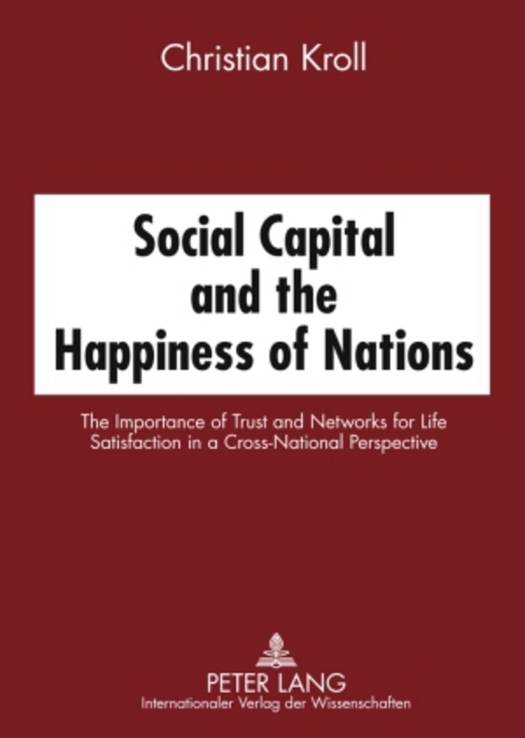
- Afhalen na 1 uur in een winkel met voorraad
- Gratis thuislevering in België vanaf € 30
- Ruim aanbod met 7 miljoen producten
- Afhalen na 1 uur in een winkel met voorraad
- Gratis thuislevering in België vanaf € 30
- Ruim aanbod met 7 miljoen producten
Zoeken
Social Capital and the Happiness of Nations
The Importance of Trust and Networks for Life Satisfaction in a Cross-National Perspective
Christian Kroll
Paperback | Engels
€ 72,95
+ 145 punten
Omschrijving
Why are people in some countries much more satisfied with their lives than people in others? In fact, the national mean life satisfaction scores of 72 countries in this study range from 3.7 to 8.5 on a 10 point scale. This book examines the importance of social capital for societal well-being with highly interesting results. If people in a rich nation increased their civic engagements from one to three memberships on average, the life satisfaction would rise by the same amount as from an increase in GDP per capita of 24,000 US-$. The effects of networks and trust, as well as GDP, unemployment, inflation and income equality are investigated in this study of World Bank and World Values Survey data including 180,000 respondents from Albania to Zimbabwe. The book discusses approaches to life satisfaction from economics, psychology, political science, biology, social anthropology, and sociology, featuring a thorough exploration of social capital theory. Important policy implications result from the findings: Rich nations have to focus on improving interpersonal ties between citizens - a paradigm shift is necessary. Moreover, economically emerging nations need to include social capital more intensively into their policy strategies. Networks of social support must be strengthened today to improve the quality of life around the globe tomorrow.
Specificaties
Betrokkenen
- Auteur(s):
- Uitgeverij:
Inhoud
- Aantal bladzijden:
- 190
- Taal:
- Engels
Eigenschappen
- Productcode (EAN):
- 9783631570159
- Verschijningsdatum:
- 25/02/2008
- Uitvoering:
- Paperback
- Formaat:
- Trade paperback (VS)
- Afmetingen:
- 148 mm x 210 mm
- Gewicht:
- 235 g

Alleen bij Standaard Boekhandel
+ 145 punten op je klantenkaart van Standaard Boekhandel
Beoordelingen
We publiceren alleen reviews die voldoen aan de voorwaarden voor reviews. Bekijk onze voorwaarden voor reviews.











